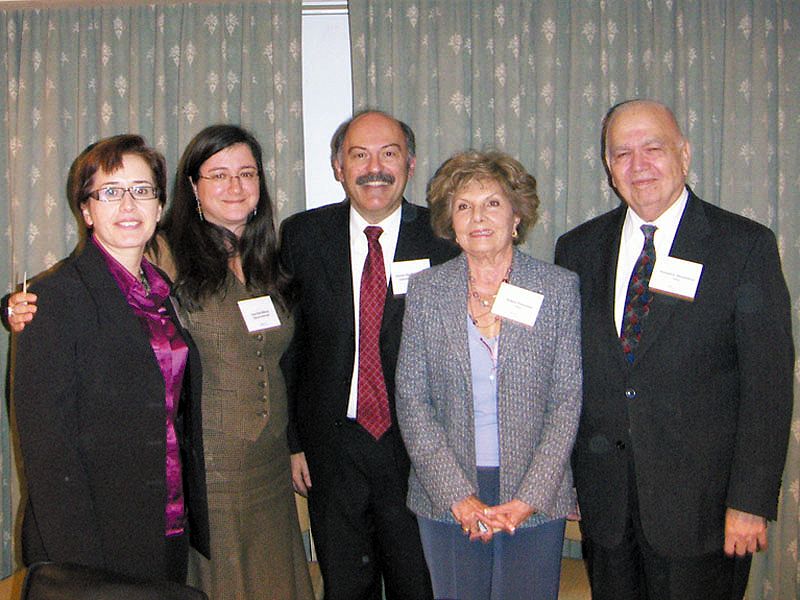Staff Writer

Photo: Mark Mamigonian
Professor Barlow Der Mugrdechian of the Armenian Studies Program traveled to Boston, MA, the weekend of Nov. 18 and 19 to participate in the 32nd Annual Membership meeting of the Society for Armenian Studies (SAS). In addition, he participated in the annual Middle East Studies Association conference.
The SAS is an international organization, which represents scholars and teachers in the field of Armenian Studies. Der Mugrdechian has been the SAS treasurer for the past two years. President Joseph Kéchichian conducted the meeting, where members gathered to hear reports on the activities of the Society over the past year, on Saturday, November 18.
Following the membership meeting, the Armenian Library and Museum of America (ALMA) invited SAS members and guests to a special reception at ALMA headquarters in Watertown. There, SAS members enjoyed a tour of the exhibits at the museum, followed by food and refreshments shared with members and friends of ALMA.
While in Boston, SAS members participated in three SAS sponsored panels, on a variety of themes. All of the panels were held on Sunday, November 19, in the Boston Marriott Copley Place Hotel, which was the conference headquarters.
One panel was “Historical Memory and Identity: Exploring the Impact of the Events of 1915-1916 in Armenian and Turkish Literature,” organized by Barlow Der Mugrdechian and chaired by Richard G. Hovannisian of UCLA. Panelists were Barlow Der Mugrdechian, California State University, Fresno, “Three Apples Fell from Heaven: Memory and Identity in Post Genocide Armenian Literature;” Hülya Adak, Sabanci University (Istanbul), “The Armenian Deportations in Turkish Fiction;” and Rubina Peroomian, UCLA, “The Metamorphosis of the Post-Genocide Armenian Identity as Reflected in Artistic Literature.” Ayshe Gül Altinay of Sabanci University (Istanbul) was the discussant for the panel.
This groundbreaking panel brought together Armenian and Turkish scholars to examine the Genocide through literature. It was an opportunity for scholars to approach the issue from differing viewpoints. More than fifty scholars were in attendance at the panel, and engaged in an exchange of ideas with the panel participants. This dialogue will continue over the next few months.
Another panel, “Narrative and Identity in the Armenian Press, 1850-1923,” was organized by Victoria Rowe. The panel was chaired by Barlow Der Mugrdechian of California State University, Fresno. Panelists were Lisa Khachaturian, Georgetown University, “Cultivating Nationhood in Imperial Russia: The Periodical Press and the Formation of a Modern Eastern Armenian Identity;” Victoria Rowe, Chuo University, Japan, “The Politics of Exile: An Armenian Women’s Journal in Egypt, 1902-1904;” and Lerna Ekmekcioglu, New York University, “How to Mother a Nation: Perspectives from the Armenian Women’s Journal Hay Gin (The Armenian Woman) (1919-1923).”
The final SAS sponsored panel was on “Circulation and the Global Trade Networks of Armenian Merchants from Julfa, Isfahan,” which was organized by Sebouh Aslanian and chaired by Razmik Panossian. The panelists were Sebouh Aslanian, Columbia University, “From “Trade Diaspora” to “Circulation Society”: The Multi-Nodal Trade Network of the Julfan Armenians in the Early Modern Period;” Francesca Trivellato, Yale University, “Business Cooperation Within and Across Trading Diasporas: A Comparative Analysis of Sephardic and Armenian Merchant Networks in the Early Modern Period;” Houri Berberian, California State University, Long Beach, “The Sceriman/Shahrimanians between Julfa and Venice: Information Networks and Commercial Prosperity of an Iranian-Armenian Family;” and Bhaswati Bhattacharya, International Institute of Asian Studies, “All the Milk and Honey of Spain Flow to Manila: Armenians in the Madras-Manila Trade in the 18th Century.”
The SAS was founded 32 years ago in Boston by Dr. Richard Hovannisian (UCLA), the late Dr. Avedis Sanjian (UCLA), Dr. Dickran Kouymjian (AUB and later Fresno State), Dr. Robert Thomson (Harvard), and Dr. Nina Garsoïan (Columbia). They set the foundations of a Society, which today has more than 200 members worldwide and is the leading organization in the field of Armenian Studies.
The SAS is dedicated to the development of Armenian Studies as an academic discipline. It has as its goals to promote the study of Armenia and all aspects of Armenian culture; to promote the teaching of Armenian subjects in educational institutions; to promote the publication of texts in various fields of Armenian studies; to organize and sponsor conferences, symposia, panels, and other forums pertaining to all aspects of Armenian culture and society; and to facilitate the exchange and dissemination of scholarly information pertaining to Armenian studies through a program of publications, consistent with the objectives of the SAS.
More information is available about SAS and its programs by contacting the SAS Secretariat, at 559-278-2669 or at the SAS home page http://armenianstudies.csufresno.edu/sas/index.htm
 Hye Sharzhoom Armenian Action
Hye Sharzhoom Armenian Action